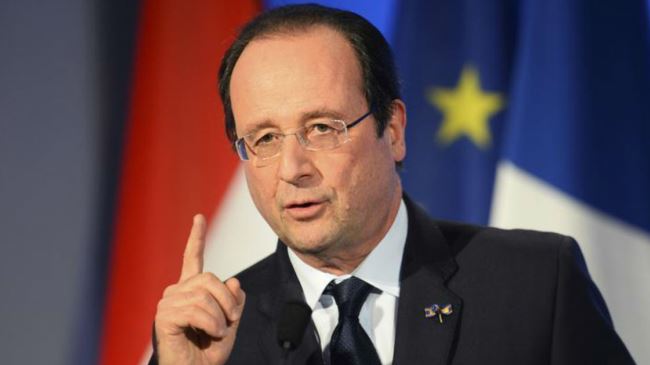PARIS, Dec. 2 (Xinhua) -- French President Francois Hollande said Thursday he would not seek a second mandate in 2017 presidential election as he suffered weak majority and long sliding approval rating.
"Today, I am aware of the risks that would trigger a process that would not gather enough support. So, I decided not to be a candidate in the presidential election," Hollande said.
"I do this by taking all my responsibility, but also by calling for a progressive start. What is at stake is not a person but the future of the country. I do not want France to expose itself to dangerous adventures," he added.
Hollande's decision, the first such move in France's fifth Republic, came after months of speculations raised by his record low popularity.
In a 10-minute televised address, Hollande said he would now focus on leading eurozone's main powerhouse in the months until the presidential election scheduled for Apr. 23 and May 7, 2017.
After five years in power clouded by high unemployment and rising security concerns, the Socialists and the broader Left are weakened by internal upheavals that made it hard for them to build momentum to take on the right-wing and the far right party.
Besides, a long-sliding popularity of Hollande has mounted pressure on the Socialists to seek the right candidate who has enough credentials to pass the first round.
As left primary is approaching, Hollande's decision not to launch a bid for a second term is likely to pave the way for his prime minister Manuel Valls who said he is "ready" to take part in the competition.
Seven contenders including former ministers Aranud Montebourg and Benoit Hamon have announced their intention to participate in the two-round left-wing primary scheduled for Jan. 22 and Jan. 29.
Former economy minister Emmanuel Macron and six other candidates have launched their own campaign, a fact likely to splinter votes and smashed the Left parties' hope to maintain power in 2017.
French pollsters predicted the French president would lose in the first round of the upcoming election with an expected vote intentions set up to 15 percent of votes.
Opinion polls also showed that no left-wing candidate would cruise to the run-off in May 7.
In May 2012, Hollande was elected the first Socialist president in 17 years with nearly 52 percent of votes over the conservative Nicolas Sarkozy.
He presented different tax receipts for the country with more taxes on the rich to help restore its finances and for Europe with acts to move away from austerity-only policies and improved measures to boost growth.
However, during his ruling period, he suffered a setback due to his failed promises to bring down joblessness, controversial reforms to muscle growth, and a softened labor market that triggered massive street protests.
Moreover, a publication of private conversations with two journalists in a book titled "A President Should Not Say That" has added insult to the injury and tainted his image as a statesman.
Critics cast doubt on his presidential credentials, saying a president should not confess so much and unveil classified information few months ahead the presidential elections.





